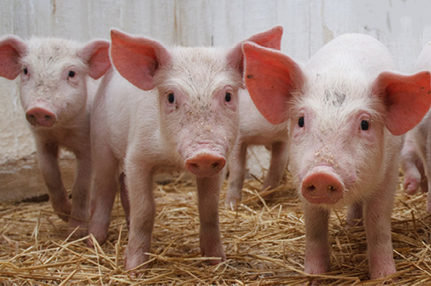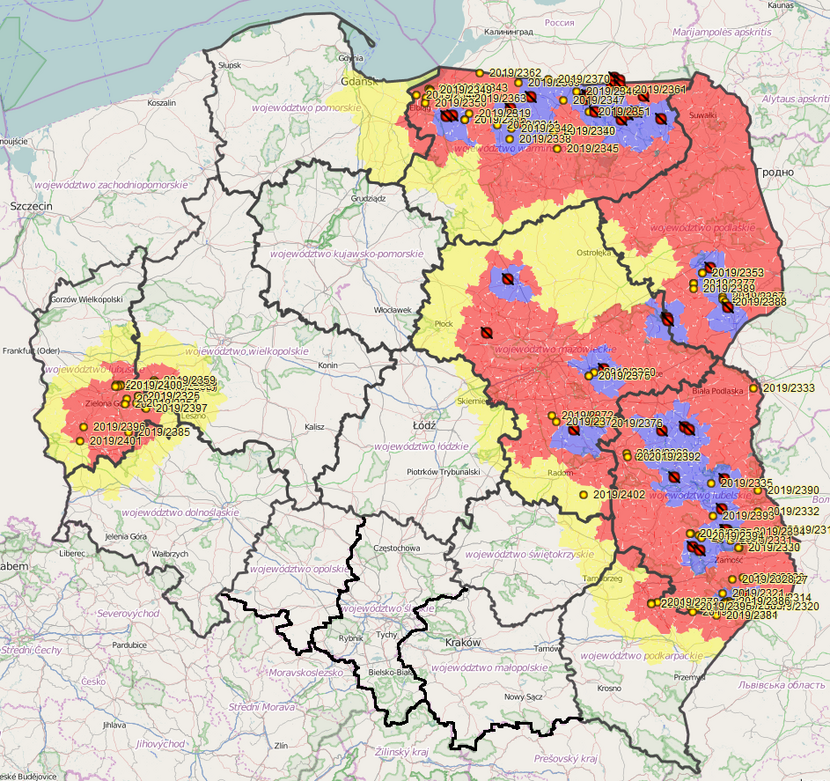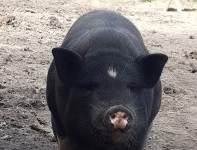Poland: update on ASF
On 17 December 2019 Commission Implementing Decision (EU) 2019/2169 amending the Annex to Implementing Decision 2014/709/EU concerning animal health control measures relating to African swine fever in certain Member States was published. It established the new ASF regionalization in Poland.

Due to the new ASF cases in wild boars in the eats and in the west of Poland, there are only 5 provinces (out of 16) not covered by any ASF restrictions.
In 2019 48 ASF outbreaks in pigs were noted in Warminsko-mazurskie, Podlaskie, Lubelskie and Mazowieckie provinces.
In 2019, 2477 ASF cases in wild boars were noted in the east of Poland (Warminsko-mazurskie, Podlaskie, Lubelskie, Mazowieckie and Podkarpackie provinces) but also, as of 14 November 2019, in the west of Poland (Lubuskie, Dolnoslaskie and Wielkopolskie provinces).

Additionally, despite being free from the disease, Pomorskie, Lodzkie and Swietokrzyskie provinces are partly covered by buffer zones, where no cases or outbreaks have been noted yet.
In 2020 no new outbreaks in pigs have been noted yet, however, 12 cases in wild board are reported: 3 in Wielkopolskie province (west of Poland), 2 in Podkarpackie province, 2 in Lubelskie province, 1 in Mazowieckie province and 4 in Podlaskie province. All of the outbreaks are noted in designated Part III or Part II areas, so where the presence of ASF in wildlife might be expected.
APPLIED MEASURES
The farmers call for intensive wild boar population reduction in order to limit the threat to their farms. The shooting of wild boars is performed by the Polish Hunting Association within the limits of its hunting plans, as well as on the basis of decisions of the district veterinary officers on additional sanitary shooting. However, the reduction is not sufficient, as assed by the Ministry of Agriculture and Rural Development, due to the unwillingness of the hunters and also the obstacles by ecologists. Therefore, the new law was prepared and passed by the lower house of the Polish Parliament on 20 December 2019.
The draft Act provides for facilitating the fight against ASF. The new regulations introduce, among others, a ban on blocking hunting, sanitary hunting of wild animals, appointing a National Hunter by the minister of the environment, the possibility of building disinfectant troughs without the need to obtain permits, using the Forest Fund to build fences, and the need for biosecurity by hunting participants. The blocking of hunting will be penalised with up to three years imprisonment. Soldiers, police, border and fire guards are to be included in the reduction of the wild boar population as part of crisis management, however, only officers with hunter certificates will be allowed to shoot wild animals. Hunting will be permitted with the use of not only night vision devices, but also silencers. According to opposition and environmentalists, this puts public safety at risk, because people working in the woods or tourists will not hear that hunting is taking place nearby.
In addition, the Act authorizes the voivode to issue an order to the forest area manager to build fences limiting or stopping the migration of wild boars in a specific area. It introduces also the possibility of punishing public road managers, who - contrary to the order of the district veterinary officer or voivode - will not close animal crossings or do not build fences.
The draft Act is now passed for work in the Senate (upper house of the Polish Parliament).

THREAT TO PIG PRODUCTION
According to the Polish Statistical Office, as of 1 June 2019, there were 10 780 477 pigs in Poland, out of which in Dolnoslaskie province: 185 667 pigs (1,7%), in Lubuskie province: 131 784 pigs (1,2%) and in Wielkopolskie province: 3 916 072 pigs (36,3%). The above data indicate that ASF outbreak in particular in Wielkopolskie province may significantly threaten the pig production.
Therefore, farmers’ organisations, together with pork industry, call for immediate actions by governmental agencies.
The National Association of Pig Producers (KZP-PTCH) is afraid that with the arrival of spring ASF will attack pig herds in Wielkopolskie province. Therefore, they call for compliance with EFSA's recommendations, which say about the simultaneous introduction of biosecurity rules, rendering of fallen boars and reduction of the population of these animals. At the same time, public awareness should be raised to protect people from information that confuses and unnecessarily sets one social group against another. In KZP-PTCH opinion, politicians should take care of regulations limiting the effects of the crisis. It should be possible, under the supervision of the Veterinary Inspection, to move between ASF restricted zones both pigs and biological material from pig herds tested negative for ASF. Additionally, farmers should receive financial assistance and the necessary knowledge about the introduction of biosecurity rules on their farms.
The other farmers’ organisation, the Polish Association of Pig Breeders and Producers (POLSUS), fears of the spreading of ASF virus and the introduction of restrictions on animal movement. "POLSUS" therefore appealed to the Minister of Agriculture to protect the population of breeding sows and implement solutions - at least for the duration of the ASF virus threat - which will not force farmers to make drastic decisions to abandon breeding. To preserve breeding flocks in the zones, it would be helpful to compensate for lost revenues, e.g. by introducing compensation for the losses of the sale of the breeding animal as a fattening pig.
Also the industry is worried about the ASF spreading. On 17 December 2019 the first working meeting of the Industry Agreement on ASF Eradication took place. Participants of the meeting proposed the appointment of an ASF Coordinator at the Council of Ministers reporting directly to the Prime Minister. One of the postulates is also the closing of all farms keeping pigs that do not comply with the principles of biosecurity. Members of the Agreement also demand the elimination of all herds of pigs that have not been registered and reported to the Veterinary Inspection and the elimination of illegal farm slaughter. They also propose to facilitate the movement of tested pigs between ASF zones under veterinary supervision. Additionally, they believe that it is necessary to issue guidelines on biosecurity for entities transporting pigs, supplying farms with feed and other means of production. The Agreement supports the possibility of using night vision devices and silencers during hunting, shortening the reporting period for collective hunting from 14 to 2 days, catching and killing of wild boars foraging in cities instead of moving them to forest areas.
After the pig industry, also the Regional Council of Wielkopolska (local self-government) appealed to the Prime Minister to take action to combat ASF. In their view, protecting pig herds against disease in Wielkopolskie Province should be a priority in government action. The council indicated, among others, the need to secure funds in the state budget to cover possible losses on farms. It also pointed out the staffing problems in the Regional Veterinary Inspectorate and requested "an increase in the level of employment of veterinary inspectors in Wielkopolska to a level guaranteeing the efficient performance of the duties imposed on this inspection". The councilors additionally support the demands of pig producers addressed to the Prime Minister to organize coordination of actions in the field of combating and preventing ASF at a supra-ministerial level.
THREAT TO GERMANY
It should be noted that the borders of the Part II area (restricted area - red zone) designated in western Poland are already less than 15 km from the border with Germany, which is practically no barrier for the ASF virus. The possible emergence of ASF virus in Germany would mean suspension of exports to third countries, at least for a certain period.
In particular the blocking of the Chinese market is feared by Germany, despite recent reports that France and Germany have concluded an agreement with China on the recognition of regionalization rules in the event of ASF occurring in wild boars and the possibility of continuing exports of pork from ASF free zones. It is worth noting that these are, however, only unofficial reports and it is not entirely clear how they will be completed at the time of actual occurrence of ASF in wild boars in Polish western neighbours.
The ban on export of German pork to China is also feared by the Polish pork producers, as it would cause a huge oversupply of pork in the EU and very large price drops.
On 18 December 2019 the German state of Brandenburg started to erect a 120-kilometer-long fence along the Oder and Neisse Lusatian. It is to prevent boars infected with African swine fever from getting to Poland from Germany.
According to the Ministry of Health and Consumer Protection in Potsdam responsible for the project, the electric fence used will be portable and will not be permanently installed. Additionally, smell repellents will be used. The fence - 90 cm high - is to cost 160,000 euro.
At the same time, national authorities urged German pig farmers to inspect their own sanitary facilities, and hunters to carefully monitor the area and report each fallen boar and send samples for ASF testing.
Another two countries bordering Poland are preparing to build the fence: Mecklenburg-Vorpommern and Saxony-Anhalt - reports dpa. The Bavarian authorities, which are not bordering Poland, are seriously considering building the fence, according to donaukurier.de